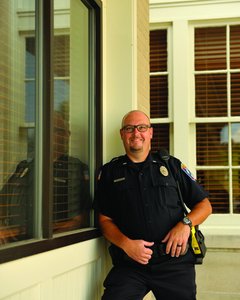Hiking the Appalachian Trail requires strength, endurance and perseverance. Travis Easton knew that having a pre-hike physical was an important step in preparing himself for a long hike on the trail, so he visited Sarah Bush Lincoln Family Physician, Lucas Catt, MD, in April 2017 so he could mark “physical” off of his preparation checklist. Travis quickly learned that he needed to prepare for a journey much more difficult than hiking.
Travis had watched his father fight prostate cancer in 2014, so he knew it was important to visit his doctor regularly, but as a husband, father and career law enforcement officer, he didn’t carve out the time. The Appalachian Trail trip was the motivation he needed to schedule his overdue physical.
During the appointment, Travis shared his family health history with Dr. Catt and asked whether a blood test should be ordered to check his prostate specific antigen (PSA) levels. While the blood test is usually performed after age 50, Dr. Catt agreed that Travis’ family history justified testing him before age 50. The next day, Dr. Catt called Travis to report that his PSA levels were significantly elevated.
Travis and his wife, Jamie (a registered nurse), were shaken by the news. They have three children: Maddie, 21, Trevor, 20, and Aly, 17. “Even though we had seen my Dad fight and win this battle, it was still such a shock to be a healthy 46-year-old father and to find out that I had [prostate cancer],” Travis said. “It was almost like time stood still that day.”
As is true of any cancer, early diagnosis is key to successfully fighting prostate cancer. More than 192,000 cases are diagnosed each year, and prostate cancer is second only to lung cancer as a cause of death among men in the US.
As a police officer and former marine, Travis is no stranger to difficult situations. His experience and training helped him focus on the battle at hand. “I went through the stages of grief like most people do,” Travis said. “I felt angry, but then I accepted it and knew I had to make a game plan and take action.”
The path through cancer diagnosis and treatment is rarely clear and easy. For the Eastons, the next two months were filled with blood tests, doctor visits, research and, eventually, surgery. “The hardest part was the waiting period between diagnosis and surgery,” Travis said. “I researched my options, and even though I didn’t like some of them, I had to put faith in the professionals. I knew I could deal with any potential lifestyle changes as long as I could be around to experience life with my family and friends.”
Travis credits Jamie for her steadfast support throughout his diagnosis and treatment. “She was the rock,” he said. “She stayed strong and focused, which helped me do what I needed to do.”
As a wife and someone with medical knowledge, Jamie had a unique perspective on the diagnosis. “Sometimes knowing too much or having seen too much can be a negative,” Jamie said. “I was always hoping and praying for the best outcome, yet, in the back of my mind, I couldn’t help thinking about the worst possibilities.”
During his treatment period, Travis’ daughter, Aly, said that her parents continued to focus on their children. “It was a confusing time because you don’t expect to see your parents get sick, especially your Dad,” Aly said. “He’s the strong person in our house, so I never saw him cry, but they didn’t hide anything from us. They were honest and set a good example for us for how parents should handle a crisis.”
Now, one year after his surgery, Travis is healthier than ever. He hiked a portion of the Appalachian Trail in October of 2017 and he plans to hike another 40-mile section this year. “Cancer made me appreciate life,” Travis said. “I went on that hike, surrounded by my friends, and the journey that I had to take to get there made the trip even more meaningful.”
Travis often reflects on how his father’s encouragement to ask for a simple test saved his life. He hopes to have the same influence on other men. He encourages his friends to make time for their annual exams and to be honest with their doctors about their family histories and health concerns. “You can’t be afraid to ask the important questions,” Travis said. “When you think about the possible consequences of avoiding the doctor, a quick visit and some blood work is no big deal.”
Jamie whole-heartedly agrees. “If my husband had not gone in for a routine physical, his outcome might have been completely different. It is so important to not only see the doctor when you’re having an issue, but to be sure to get preventive care as well. It really could save your life,” she said.

